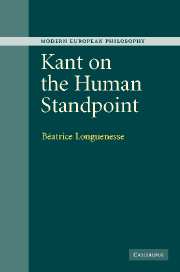Book contents
- Frontmatter
- Contents
- Acknowledgments
- Introduction
- PART I Revisiting the capacity to judge
- PART II The human standpoint in the Transcendental Analytic
- 4 Kant on a priori concepts: the metaphysical deduction of the categories
- 5 Kant's deconstruction of the principle of sufficient reason
- 6 Kant on causality: what was he trying to prove?
- 7 Kant's standpoint on the whole: disjunctive judgment, community, and the Third Analogy of Experience
- Part III The human standpoint in the critical system
- Bibliography
- Index of citations
- Index of subjects
5 - Kant's deconstruction of the principle of sufficient reason
Published online by Cambridge University Press: 22 September 2009
- Frontmatter
- Contents
- Acknowledgments
- Introduction
- PART I Revisiting the capacity to judge
- PART II The human standpoint in the Transcendental Analytic
- 4 Kant on a priori concepts: the metaphysical deduction of the categories
- 5 Kant's deconstruction of the principle of sufficient reason
- 6 Kant on causality: what was he trying to prove?
- 7 Kant's standpoint on the whole: disjunctive judgment, community, and the Third Analogy of Experience
- Part III The human standpoint in the critical system
- Bibliography
- Index of citations
- Index of subjects
Summary
On three occasions in the Critique of Pure Reason, Kant takes credit for having finally provided the proof of the “principle of sufficient reason” that his predecessors in post-Leibnizian German philosophy had sought in vain. They could not provide such a proof, he says, because they lacked the transcendental method of the Critique of Pure Reason. According to this method, one proves the truth of a synthetic a priori principle (for instance, the causal principle) by proving two things: (1) that the conditions of possibility of our experience of an object are also the conditions of possibility of this object itself (this is the argument Kant makes in the Transcendental Deduction of the Categories); (2) that presupposing the truth of the synthetic principle under consideration (for instance, the causal principle, but also all the other “principles of pure understanding”) is a condition of possibility of our experience of any object, and therefore (by virtue of [1]), of this object itself. What Kant describes as his “proof of the principle of sufficient reason” is none other than his proof, according to this method, of the causal principle in the Second Analogy of Experience, in the Critique of Pure Reason (cf. A200–1/B246–7, A217/B265, A783/B811).
Now this claim is somewhat surprising. In Leibniz, and in Christian Wolff – the main representative of the post-Leibnizian school of German philosophy discussed by Kant – the causal principle is only one of the specifications of the principle of sufficient reason.
- Type
- Chapter
- Information
- Kant on the Human Standpoint , pp. 117 - 142Publisher: Cambridge University PressPrint publication year: 2005
- 2
- Cited by



